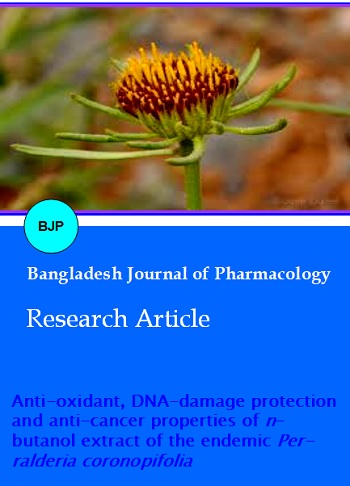Antioxidant, DNA-damage protection and anti-cancer properties of n-butanol extract of the endemic Perralderia coronopifolia
DOI:
https://doi.org/10.3329/bjp.v13i1.34255Keywords:
Anti-cancer, Antioxidant, DNA-damage, Perralderia coronopifoliaAbstract
This study was designed to evaluate in vitro the total phenolic, flavonoid content, antioxidant activity, oxidative DNA-damage protection and anti-cancer activity of n-butanol extract from Perralderia coronopifolia, endemic plant. DNA protection capacity was performed using 46966 plasmid DNA against UV-photolysis of H2O2-induced oxidative damage. The antiproliferative effects of extract were performed on HeLa and C6 cells. Experimental results showed that extract had convenient number of phenolic and flavonoids. Furthermore, it provided strong anti-oxidant, reducing power, hydrogen peroxide and higher DPPH· scavenging ability with IC50= 7.02 ± 0.02 µg/mL. As it shown an oxidative plasmid DNA-damage inhibition against UV-photolysis of H2O2, an anti-cancer activity athigher concentrations in cells. The data obtained that P. coronopifolia extract could be useful in human protection against infection and degenerative illness.
Video Component of Methodology:
Metal chelating activity: 2 min 56 sec Click to watch
Downloads
193
210 Read
35

Published
How to Cite
Issue
Section
License
Authors who publish with this journal agree to the following terms:
- Authors retain copyright and grant the journal right of first publication with the work simultaneously licensed under a Creative Commons Attribution License that allows others to share the work with an acknowledgement of the work's authorship and initial publication in this journal.
- Authors are able to enter into separate, additional contractual arrangements for the non-exclusive distribution of the journal's published version of the work (e.g., post it to an institutional repository or publish it in a book), with an acknowledgement of its initial publication in this journal.
- Authors are permitted and encouraged to post their work online (e.g., in institutional repositories or on their website) prior to and during the submission process, as it can lead to productive exchanges, as well as earlier and greater citation of published work (See The Effect of Open Access).
